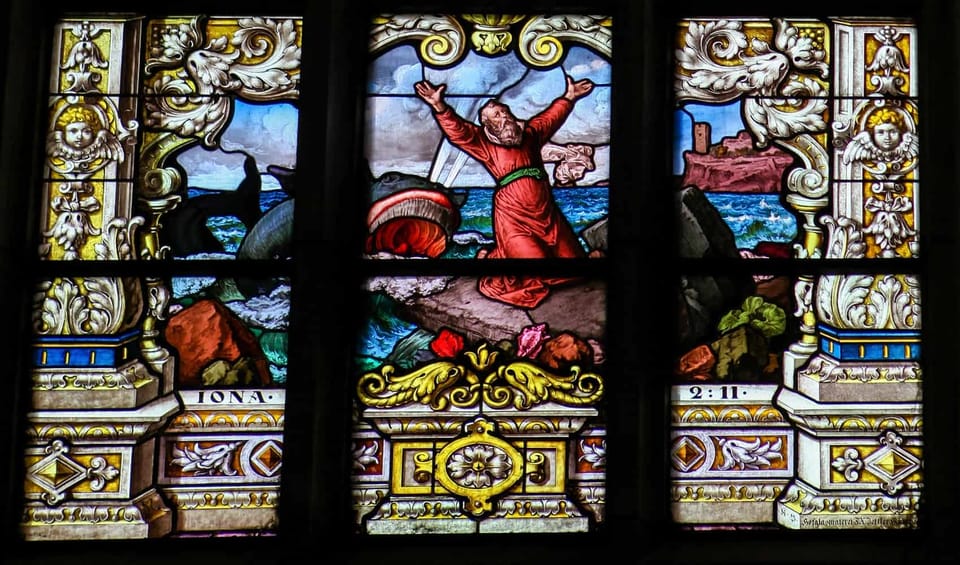A Heart for our Community (Jonah)

Big Idea: Go to the hard places with brokenness, boldness, and love.
Eight years ago I began to develop a deep passion for church planting in the city of Toronto. I’d always loved Toronto since I came out of the subway stop at Runnymede station almost 30 years ago now. But for the first time I began to see the importance of church planting in Toronto. I started praying for God to inspire church planters to establish churches throughout Toronto, especially in areas without a gospel presence.
At the time I was pastor of an established church. I knew one thing: God would not send me to plant a church. I was too old and probably not cut out to be a church planter. But truth be told: I wasn’t sure I wanted to risk myself like that. I didn’t want the financial inconvenience, the upheaval, and especially the potential of failure.
So you understand the position I was in. I grasped God's love for Toronto. I knew that it was bustling with new growth even as churches were in retreat. I was aware of communities in which there were no churches to show and tell the gospel. I was convinced that God cared about these people, and I wanted someone to go. But I was convinced that I shouldn’t go. I would much rather have left that to someone else.
It’s for this reason that I want to look at the book of Jonah with you today. The reason is that there’s a bit of a disconnect for a lot of us. We understand God’s heart for people, but we don’t want to go.
I’m convinced that I’m a lot like Jonah, and you are too. Jonah is a kind of a missionary manual. One preacher said, “To know Jonah is to love him. And the reason we love him is because he is so much like us” (Lloyd John Ogilvie).
Today, I want to discuss the gap between understanding God’s heart and gospel and the reluctance to serve the city.
Setting the Scene
Let me cut right to the chase.
Jonah teaches us two things that we really need to understand. The first is this:
We serve a God who loves the hard places and the hard people.
God says to Jonah in chapter 1:
Arise, go to Nineveh, that great city, and call out against it, for their evil has come up before me. (Jonah 1:2)
You need to understand a little bit about Nineveh to understand how shocking this would have been.
Nineveh was the capital of the Assyrian empire. Assyria was Israel’s worst enemy at that time. It was a city known for its violence, immorality, and idolatry. They were a militaristic society known for violence and cruelty in warfare.
They would conquer cities and skin many men, women, and children alive, displaying their skins on the city walls. They would bury skinned people alive up to their heads in sand, pull their tongues out, and stake them to the ground, leaving them to suffer in pain and die of thirst. They would rape the women and kill them; they even boasted about raping and killing little girls. One account describes how they would capture the soldiers and impale some of them alive outside the city gates. They would behead all these people and make a mountain of heads outside the city so they could say, “This is what happens to those who dare oppose the Assyrians.”
One writer observes, “It’s safe to say that no people in the span of biblical history had a worse reputation for brutality and arrogance than the Assyrians” (Tullian Tchividjian).
In other words, you wouldn’t want to go there. You wouldn't care about them. But God did.
God sent Jonah to preach there. We learn the message in Jonah 3:4: “Yet forty days, and Nineveh shall be overthrown!” Although the message seems harsh, the reason God wanted Jonah to go to Nineveh is because he is merciful to even people that seem resistant no matter what barriers seem to stand between them and the gospel. According to ancient Assyrian records, a complete solar eclipse occurred on June 15, 763 B.C. Soon after the eclipse, floods and a famine followed. If our time estimates are correct, Jonah would have come to Nineveh months or perhaps years after the eclipse, flood, and famine. They may very well have been prepared the hear the message that God sent Jonah to give them, and to turn to God. God had been preparing them, and in fact the people of Nineveh would receive the message and repent. We read in chapter 3 that the king repented and called people to turn to God. We read at the end of chapter 3 that God withheld his judgment from them.
God is a God of mercy. As part of his mercy, God enlisted one of his own people to cross ethnic boundaries and comfort zones.
I hope as you read this book that you don’t miss a mini-theology about the city, found in Jonah 4:11: “And should not I pity Nineveh, that great city, in which there are more than 120,000 persons who do not know their right hand from their left, and also much cattle?” Tim Keller put it this way: God cares about everywhere where there are people, because people are made in his image. But there is more image of God per square mile in cities, so cities matter. Everywhere matters, of course, but cities matter because they’re filled with people. Understand God’s heart for cities and the people who live in them.
Friends, I hope you can see God’s heart for people, even those that we would be quick to write off. God is so merciful. God’s mercy is one of the central themes of this book. I hope you grasp that nobody is beyond the scope of God’s mercy. Think of the hardest places, the hardest people, the people we’d never expect to respond to God’s love, and understand God’s boundless love for them.
But there’s another theme in the book of Jonah, and it’s this.
We are a people who are resistant to go.
When God told Jonah to go, Jonah instead fled in the exact opposite direction. We read in Jonah 1:3: “He went down to Joppa and found a ship going to Tarshish. So he paid the fare and went down into it, to go with them to Tarshish, away from the presence of the LORD.” Tarshish was located in southern Spain. It was the most distant city known to Israel. Jonah went in exactly the wrong direction to the farthest place he could think of. God loves hard places and people, but we’re very reluctant to go.
Not only that, but even when Jonah did go, he was ticked off that his mission succeeded. You would think that Jonah would have been reluctant to go to Nineveh because of the difficulties and danger, but that wasn’t the real reason. The real reason Jonah didn’t want to go is found in chapter 4:2: “That is why I made haste to flee to Tarshish; for I knew that you are a gracious God and merciful, slow to anger and abounding in steadfast love, and relenting from disaster” (Jonah 4:2).
To be honest, I can relate. Eight years ago, I had a growing desire for Toronto, but I couldn’t see that I was the one to respond myself. Jonah had correct theology about God, expressed in orthodox terms, yet he had revulsion for the people God wanted to save. And this is the history of the church, from Acts to today. While we can grasp God's love for cities, we often hesitate to venture there ourselves.
The Missing Pieces
And so these twin themes weave through the book of Jonah: that God loves hard places and hard people, but we’re resistant to go. If you want to ask me the theme of the book of Jonah, this is what I would tell you: God loves hard places and hard people, and yet we’re resistant to go.
You may have noticed that, although I was reluctant just like Jonah, I ended up going. For the remaining moments that I have, I want to share with you three things that overcame my reluctance, and I hope that if there’s anyone that can relate to Jonah and to me that you will find it helpful too.
Brokenness
I would never wish brokenness on anyone, but it’s what God used in Jonah’s life, and it’s what he’s used in mine too.
Before Jonah is used by God, he has to be broken by God. And so chapters 1 and 2 are all about Jonah discovering that he needs God’s grace as much as the people of Nineveh do. Before Jonah would be used by God, he had to be humbled by God. He had to learn what Dallas Willard once said: “The sinner is not the one who uses a lot of grace… The saint burns grace like a 747 burns fuel on take off.” It’s not just the people out there who need God’s grace. We need just as much grace as they do, and the sooner we learn that, the sooner we’ll be prepared to go.
When we began the process of planting in Liberty Village, I thought we would come in strength. In the first year of planting, we were brought to our knees in dependence on God. I felt resentful for a while, until one day my wife Char said to me, “What if brokenness isn’t a distraction from how God wants us to serve, but is actually how God wants us to serve?” That question changed everything for me. God broke Jonah. He broke me too. Don’t be surprised if God breaks you in the process of sending you. We need God’s grace as much as anyone.
Boldness
The place where God sent Jonah was a stronghold of darkness. It was the sin center of the world. People were perverse, sadistic, evil. To arrive alone with a message from an unknown God against such a city was ludicrous in the extreme. To walk in with a message like Jonah did seemed like an exercise in futility. And yet it worked! God used the message and it changed the entire city.
To go into Toronto with the message we proclaim also seems ludicrous. Here’s the good news we believe: that God so loves this world that he’s redeeming it, both people and all creation, through the work of King Jesus who lived, died, and rose again, and is coming back to reign. His message has both personal and cosmic implications. To go into a sophisticated city with a message like this seems crazy — and it’s exactly what God is using to change lives all around us.
God used brokenness and boldness in Jonah, and he can use these in our lives as well. But there’s one more thing we need.
Love
The book of Jonah has one of the strangest endings ever. In the end, Jonah complains and sulks that God doesn’t judge Nineveh. He hates that God is so gracious. God challenges him. In essence, he asks Jonah, “Are you sure you have gauged this situation correctly?” And the book ends before Jonah answers the question.
It’s a very unusual ending. The question is left hanging so that we have to wrestle with the question too. Jonah failed to love the people of Nineveh the way that God loved them. What about us? Will we love the people of Toronto the way God does, or will we like Jonah take a pass on caring about them as much as God does?
One of the scariest quotes I’ve read about the book of Jonah is this: “He creates his own domain in the shade where he will be at peace according to his own measure, just as Christians try to make a church according to their own measure” (Jacques Ellul). The quote means that it’s possible to make ourselves as comfortable in church as Jonah was under the tree in Jonah 4 without really caring about the people around us that God cares about.
My friend of mine planted a church in Portland, Oregon. It’s done quite well now, but the early days were kind of tough. One night they were praying for their church and their city. One of the people at the meeting said, “I have to admit: I don’t really care about my city. I don’t care about my neighbors. I’m content to live life for myself and I have to admit: I don’t really care about them.”
That confession changed everything. The church began a period of serious self-examination and repentance for not caring about the city. It changed the entire trajectory of the church.
The missing piece isn’t action. The missing piece is that we just don’t care.
Our greatest issue isn’t a how-to problem. Our greatest issue is a want-to problem — and this can only be overcome by asking God to overcome our reluctance and change our hearts.
The place to begin isn’t with going out and reaching out cities. That comes later. The place to begin is with repentance. Jonah never got there. Will we?
Eight years ago I was wrestling with these things. If I’m completely honest, I have to admit that I’m still wrestling with these things. But something’s changed. I’m planting a church not because I’m an expert at planting a church, but because I care. I really care about the people of Toronto. I understand what Paul said when he meant, “For the love of Christ compels us…” (2 Corinthians 5:14).
God is on a mission. We serve a God who loves the hard places and the hard people. When you look at Scripture and history, God is on this relentless pursuit of people with mercy and love.
But we’re slow to join him. Our history has been one of preferring our own agenda rather than God’s. When it comes to the gospel and serving our city, it comes down to our heart. It comes down to being broken, becoming bold, and then loving the way that God does.
The book of Jonah ends with the question unresolved. We never find out how Jonah responds. But I wonder about how you will respond. Will you, like Jonah, be resistant? Or will you join God and join Jesus in serving the city with the gospel, crossing barriers, and loving people in God’s name?
Lord, I’m far too much like Jonah for my liking. Change my heart. And change the hearts of all kinds of people here this morning too. Give us your heart for this city, and then allow our actions to catch up with our hearts. We pray this in Jesus’ name. Amen.





